Genealogy: Its Significance Across Religions and in the Modern World
Genealogy, the study of family history and lineage, traces ancestry through written records, oral traditions, and genetic analysis. It serves to uncover familial relationships, preserve cultural heritage, and connect individuals to their historical and social roots. By constructing family trees with details like names, births, marriages, and deaths, genealogy reveals broader historical contexts. Across cultures and religions, including Islam, genealogy safeguards identity, strengthens family ties, and upholds social and legal obligations. In the modern era, technologies such as digital archives, DNA testing, and specialized software have transformed genealogy, bridging past and present to deepen our understanding of heritage and belonging.
Genealogy in Islam: Spiritual and Social Significance
In Islam, genealogy holds profound spiritual and social importance, serving as a tool for ethical conduct, legal rights, and religious duty. The Quran emphasizes lineage and family ties to ensure social harmony, as seen in Surah An-Nisa 4:1: "And fear Allah, through Whom you ask one another, and [fear Him regarding] the wombs [that bore you]. Indeed, Allah is ever, over you, an Observer." This verse underscores the sacredness of family relationships, fulfilled through preserving genealogy to maintain respect and kinship.
Islamic inheritance laws, detailed in the Quran (e.g., Surah An-Nisa 4:11-12), rely on accurate genealogical records to ensure fair distribution of wealth among heirs. Maintaining family ties, or Silat Ar-Rahm, is a core religious obligation, with the Prophet Muhammad (peace be upon him) stating, "Whoever believes in Allah and the Last Day, let him maintain the ties of kinship" (Sahih al-Bukhari, Hadith 6138). Genealogy facilitates this duty by helping Muslims identify and nurture familial connections, fostering spiritual rewards in this life and the Hereafter.
The lineage of the Prophet Muhammad ﷺ is meticulously preserved, reflecting the pride and honor Islam places on noble ancestry. This lineage, known as the Hashemite line, traces back to the Quraysh tribe and to Prophet Ibrahim (Abraham, peace be upon him) through his son Prophet Ismail (Ishmael, peace be upon him).
The Quran affirms this connection in Surah Al-Baqarah 2:124-129, where Ibrahim and Ismail are depicted as founders of the Kaaba, establishing a spiritual legacy that culminates in the Prophethood of Muhammad ﷺ. Islamic tradition, as recorded in Ibn Hisham’s Sirat Rasul Allah, details the genealogy: Muhammad ibn Abdullah ibn Abdul Muttalib ibn Hashim ibn Abd Manaf, extending to Adnan, a descendant of Ismail. This lineage underscores the Prophet’s ﷺ role as the final messenger in a chain of prophets, fulfilling Ibrahim’s prayer for a leader from his progeny (Quran, Surah Al-Baqarah 2:129). The preservation of this lineage reinforces the theological unity of monotheism (Tawhid) across Abrahamic faiths, linking Islam to Judaism and Christianity through shared ancestry.
The descendants of the Prophet Muhammad ﷺ, known as Sayyids (through his daughter Fatima and her husband Ali ibn Abi Talib), hold a revered status in Islamic societies. Sayyids, also called Sharifs in some regions, are spread across the Muslim world, including the Middle East, North Africa, and South Asia. In Yemen, Sayyid families descending from the Prophet’s great-grandson Alawi ibn Ubaydullah ibn Ahmad al-Muhajir have historically served as scholars and community leaders, as noted in Ibn Hisham’s accounts of early Islamic migrations.
In South Asia, Sayyid families, such as those in the Indian subcontinent, maintain genealogical records through family chronicles, often overseen by local religious authorities. In Morocco, the Idrisid dynasty, founded by Idris ibn Abdullah, a Sayyid, established a lasting Islamic legacy in the 8th century, as documented in historical chronicles like Al-Bayan al-Mughrib by Ibn Idhari. These families preserve their lineage through oral traditions, written records, and institutions like the Diwan al-Ashraf in Jordan, which authenticates Sayyid descent.
The interplay of Sayyid lineage with Islamic genealogy is multifaceted. Socially, Sayyids often serve as religious scholars, mediators, or community leaders, reflecting their spiritual proximity to the Prophet. Legally, their lineage can affect inheritance rights, ensuring priority in family estates per Islamic law. However, challenges arise from undocumented migrations or false claims, which the Prophet ﷺ condemned: “Whoever claims to belong to someone other than his father, knowingly, Paradise will be forbidden for him” (Sahih al-Bukhari, Hadith 6766). The Prophet’s emphasis on learning lineage encourages Sayyids and others to maintain kinship and heritage, reinforcing genealogy’s spiritual role.
Here are some hadiths that emphasizes on the importance of lineage:
Abu Hurairah narrated that the Messenger of Allah ﷺ said:
"Learn enough about your lineage to facilitate keeping your ties of kinship. For indeed keeping the ties of kinship encourages affection among the relatives, increases the wealth, and increases the lifespan." (Sunan At-Tirmidhi, Hadith 1979)
Abu Hurairah (May Allah be pleased with him) said:
The Messenger of Allah (ﷺ) said, "Two things are signs of disbelief on the part of those who indulge in them: Slandering one's lineage and wailing over the dead." (Sahih Muslim 67)
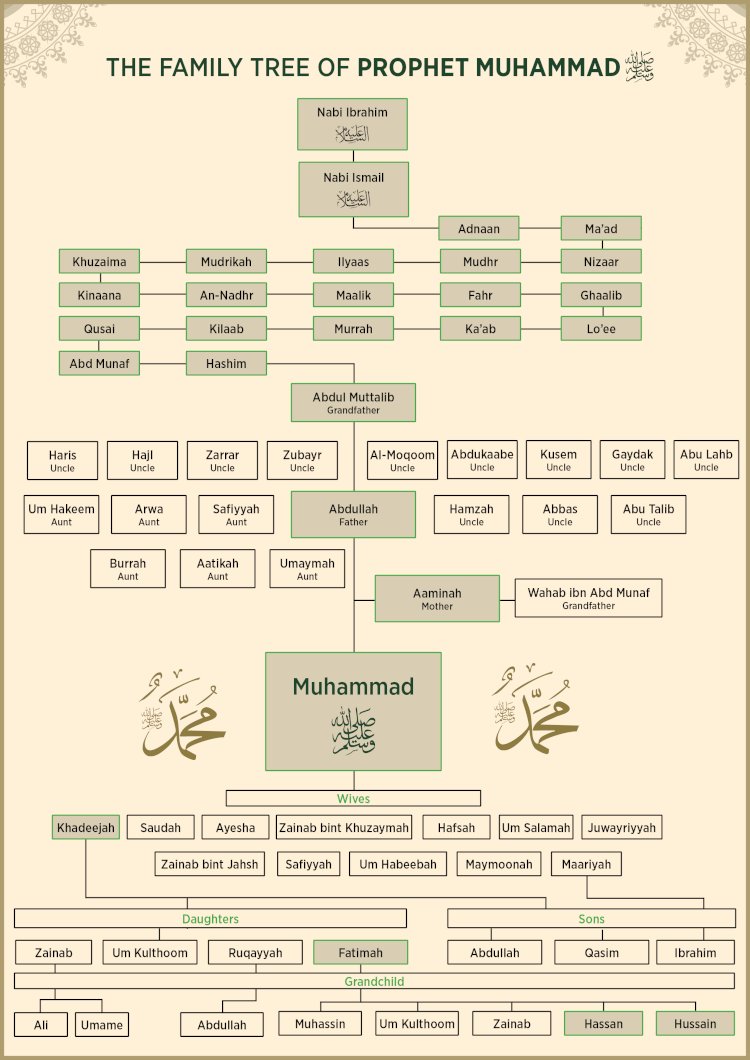
Family tree of Prophet Muhammad ﷺ.
Genealogy in Other Religions
Christianity
In Christianity, genealogy establishes prophetic fulfillment. The Gospels of Matthew (1:1–17) and Luke (3:23–38) trace Jesus Christ’s lineage to King David, fulfilling Old Testament prophecies of the Messiah (Isaiah 11:1). These genealogies hold theological weight, affirming Jesus’s divine mission. In many Christian denominations, genealogical records support sacraments like baptism, ensuring family ties are recognized within the church community.
Judaism
Judaism relies on genealogy for tribal identity, religious roles, and messianic expectations. Knowledge of one’s tribe, such as the Levites for priestly duties, is essential for rituals and temple service (Numbers 1:47-53). The Messiah is expected to descend from King David, making lineage critical (Jeremiah 23:5). Genealogical records also inform adherence to laws like kashrut, which may vary by family tradition.
Hinduism
In Hinduism, genealogy is tied to dharma (righteousness) and social structure. The varna (caste) and jati (sub-caste) systems, often linked to ancestry, define societal roles. Epic texts like the Mahabharata and Ramayana document genealogies of dynasties and deities, illustrating ancestry’s influence on destiny. For example, the Pandavas’ lineage in the Mahabharata shapes their claim to the throne, reflecting dharma’s interplay with heritage.
Buddhism
While less central, genealogy holds significance in Buddhism through the Buddha’s royal lineage. Born into the Shakya clan, the Buddha’s ancestry is recorded in texts like the Ambattha Sutta (Digha Nikaya 3), which details his noble heritage. In Theravada Buddhist communities, genealogical records sometimes determine eligibility for monastic leadership, preserving spiritual authority.
Indigenous Religions
In indigenous traditions, genealogy connects individuals to ancestors, land, and spirits. For example, among the Yoruba of Nigeria, oral genealogies trace spiritual leadership to ensure accurate transmission of Ifa divination practices. Similarly, Native American tribes like the Navajo use clan genealogies to maintain cultural practices and kinship obligations, linking present generations to ancestral wisdom.
Genealogy in the Modern World
Genealogy has gained prominence in the modern world as individuals seek to understand their heritage and identity. Globalization has spurred interest in ancestral roots, fostering a sense of belonging amid diverse societies. Digital platforms like FamilySearch and Ancestry.com have revolutionized genealogy, enabling access to historical records worldwide.
In healthcare, genetic genealogy identifies hereditary health risks. For example, BRCA gene testing helps individuals assess breast cancer risk, guiding preventive measures. Legally, genealogy resolves inheritance disputes, as seen in a 2022 UAE case where genealogical records clarified property rights among siblings. In anthropology, genealogy traces human migrations, such as the spread of Indo-European languages, enriching our understanding of global history.
Digital tools, including online archives and specialized software, have democratized genealogy, making records accessible worldwide. These advancements bridge past and present, offering insights into identity, health, and migration patterns.
Conclusion
Genealogy is a vital tool for understanding personal, cultural, and historical identities across religions and in modern contexts. In Islam, it upholds family ties, inheritance rights, and spiritual heritage, as emphasized by Quranic injunctions and Prophetic teachings. Other religions, from Christianity to indigenous traditions, similarly value genealogy for spiritual and social purposes. In today’s world, genealogy informs health, legal, and anthropological domains, with technology enhancing its accessibility and impact. By preserving heritage and connecting generations, genealogy remains an indispensable instrument for human history and society.
About the author:
Yoosuf Sabith is a degree scholar at Darul Hidaya Da’wa College, Manur, specializing in Quran and Related Sciences. His research explores Islamic heritage, family ethics, and cultural preservation, with a focus on applying Quranic principles to contemporary issues.
Endnotes
- Quran, Surah An-Nisa 4:1, Sahih International Translation.
- Sahih al-Bukhari, Hadith 6138, Book 78, Hadith 146.
- Sunan At-Tirmidhi, Hadith 1979, Book 27, Hadith 85.
- Sahih al-Bukhari, Hadith 6766, Book 86, Hadith 95.
- Sahih Muslim 67 Book 1, Hadith 133
- Quran, Surah Al-Baqarah 2:124-129, Sahih International Translation.
- Ibn Hisham, Sirat Rasul Allah, translated by A. Guillaume, Oxford University Press, 1955, pp. 3-4.
- Ibn Idhari, Al-Bayan al-Mughrib, edited by G.S. Colin and E. Lévi-Provençal, Leiden, 1948, pp. 15-20.
- Bible, Gospel of Matthew 1:1–17, New International Version.
- Bible, Gospel of Luke 3:23–38, New International Version.
- Ambattha Sutta, Digha Nikaya 3, translated by Maurice Walshe, Wisdom Publications, 1995.
- “The Role of Genealogy in Yoruba Ifa Tradition,” Journal of African Cultural Studies, vol. 34, no. 2, 2022, pp. 145–160.
Disclaimer
The views expressed in this article are the author’s own and do not necessarily mirror Islamonweb’s editorial stance.

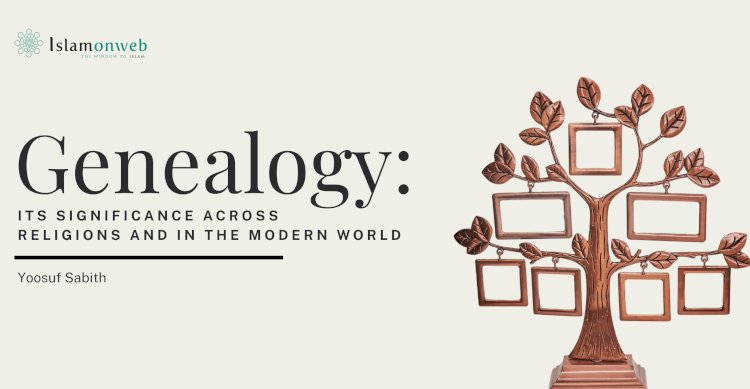


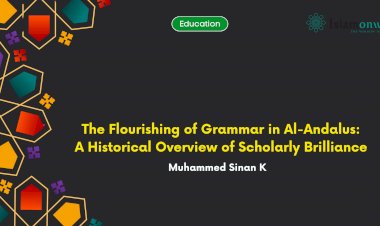
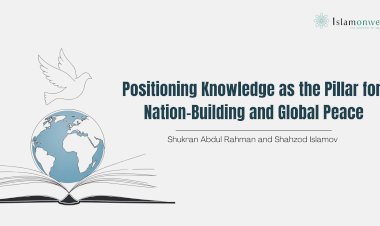
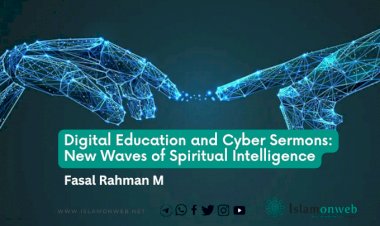
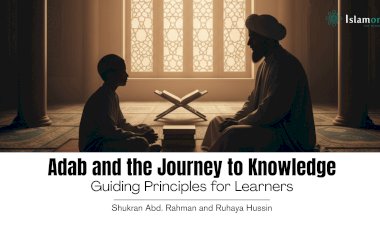

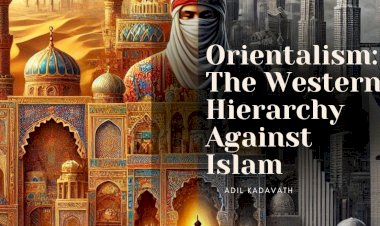














Leave A Comment